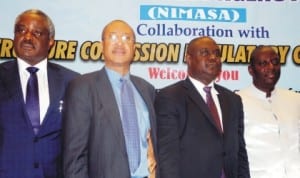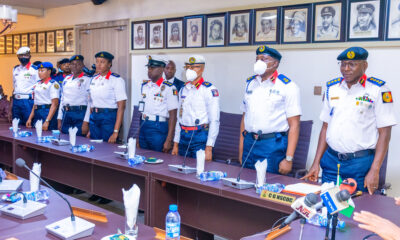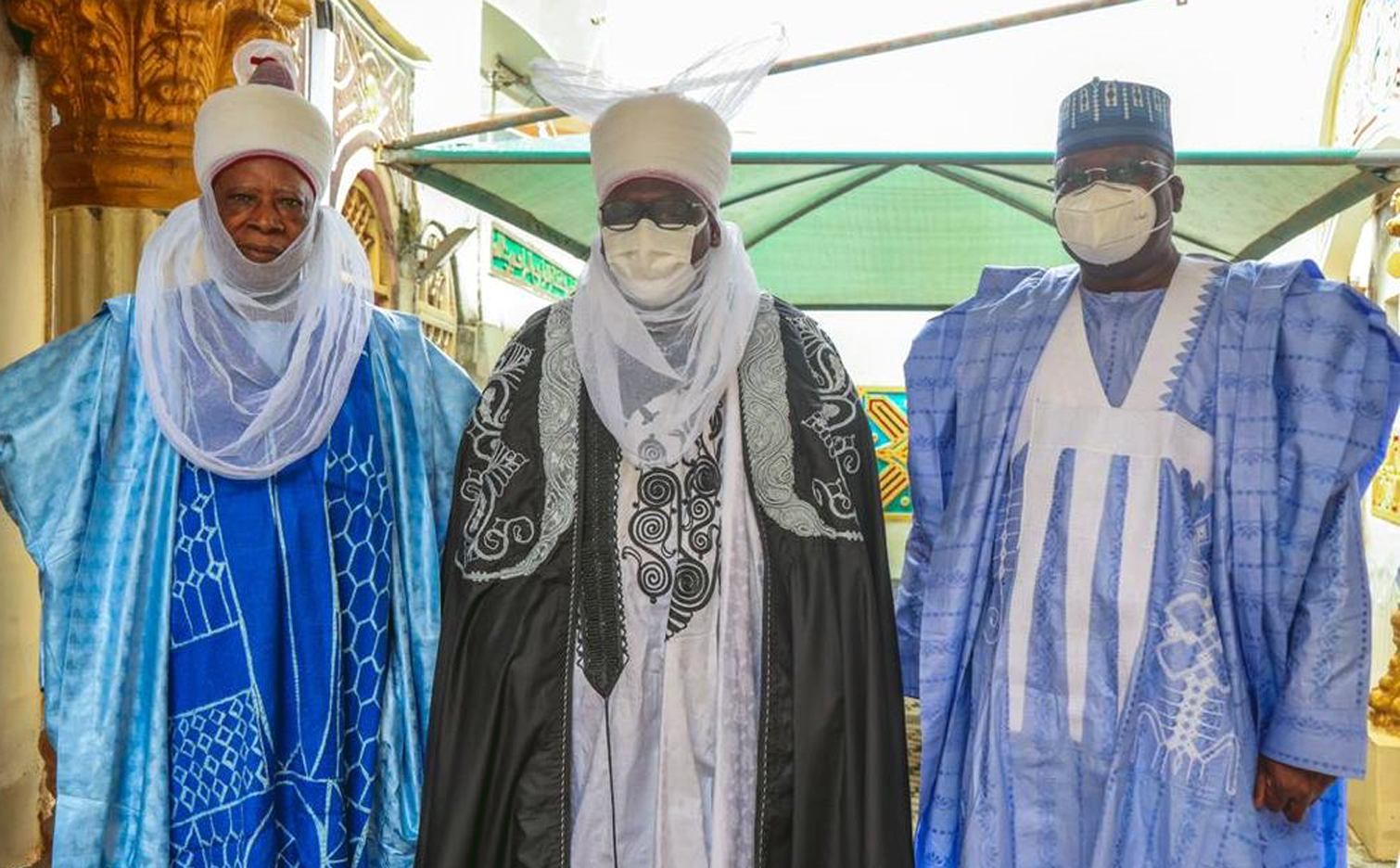Maritime
Jonathan Approves N2bn Maritime Institute For Rivers
President Goodluck
Jonathan has approved two billion naira for a maritime training institute in Obu-Ama community in Degema Local Government Area of Rivers State for the training of ex-militants and other Nigerians.
The institute, which is expected to metamorphose into a Maritime University when completed, will mark the end of training of ex-militants in maritime related studies outside Nigeria.
Presidential Adviser on the Niger Delta, Kingsley Kuku was reported to have disclosed this recently when he visited the Obu-Ama Community to assess the site of the proposed maritime training institute which will commence operation within the next one year.
Accompanied by the leader of the Niger Delta Peoples Volunteer Force, Asari Dokubo, Kuku explained that the presidential amnesty office has already defended the project before the National Assembly during deliberations on the 2014 appropriation budget.
He explained that the presidency decided to site the project in Obu-Ama as part of President Goodluck Jonathan’s transformation agenda and the need to bring development to the coastal communities.
According to a Maritime source, the construction of the maritime institute, which will admit some 500 ex-militants, will cost about N2 billion.
He said the project would include hostel facilities and staff quarters for teachers.
Kuku expressed optimism that the institute when completed will drive business activities, employment and empowerment in the country and its environs.
He said: “The project we are going to site here is called Maritime Training Institute. This project when completed is going to accommodate 500 students at a time. We are also going to have hostels that will accommodate 500 people and there will be staff quarters for those who are going to be lecturers there. Some of them are going to be your sons and daughters. We are going to train them to come and train the people in that school. We are going to send five of your sons outside this country to be trained as trainers in maritime studies. I foresee a situation where this institute will become a university or tertiary institution in time to come. We need to go to these native communities that are demanding development and one of such is this old community that was founded in 1882 by the late Tom Harry. Mr. President will be happy with what we are doing here today”.
Kuku said that the institute’s location in Obu-Ama was also in honour of Asari Dokubo whom he described as one of those who brought the issue of underdevelopment and poverty in the Niger Delta to the fore of national and global discourse.
Asari Dokubo on his part commended the Presidency for the institute, which he observed, will transform the community into a university town, soon.
“This honour is not done to me, it is done for the community and everyone of us. This institution will metamorphose into a university. Obu-Ama is going to be a university town very soon. Kingsley has trained two pilots from this community. They are going to be trained in the best maritime institutes in the world”, he said.

L-R: Chairman, Board of Directors, Oil and Gas Free Zone Authority, Mr Chris Asoluka, Guest Speaker, Prof. Pat Utomi, representative of Minister of Transport, Mr Oqua Eta and Director-General, Nigerian Maritime Administration and Safety Agency (NIMASA), Mr Patrick Lokemi, at the National Workshop on Public Private Partnership Strategy for Infrastructural Development and Modernisation in the Nigerian Maritime Sector in Lagos, recently.
Maritime
Twenty-Four-Hour Port Operations Achievable, If -Nweke

The former President of the Nigeria Association of Government Approved Freight Forwarders (NAGAFF), Dr. Eugene Nweke, has said that only a political will would make the 24-hour port operations achievable.
Nweke made the disclosure during the Fifth Town Hall meeting organised by JournalNG held in Lagos on Thursday.
“24 hour port operations is achievable if government would give a clear order to the effect.
“Government should get a regulatory agency to supervise port operations accurately for monitoring and evaluation.
“Once everyone knows what to do, operators will be guided. It will not be a situation where government issues port order without monitoring and no enforcement.
“So, we need a political will to drive our ports for 24-hour port operations in Nigeria”, Nweke said.
He said government agencies should see the transformation as a necessity, same as port stakeholders.
Nweke continued that collaboration and partnership among stakeholders would enable both government and port users achieve 24-hour port operations.
He said any identified bottlenecks delaying the achievement of 24 hours ports operations should be removed and sanctioned accordingly.
He noted that port communities are meant for commercial activities, adding that necessary infrastructure should be considered in the ports to avoid unnecessary human element.
Nweke urged government to improve on infrastructure to make the ports more attractive and friendly for customers.
Also in his presentation, the Chairman, Nigeria Ports Consultative Council (NPCC), Mr. Bolaji Sunmola, said quest to actualise 24-hour port operations in Nigerian seaports was no longer aspirational but necessary.
He said with a carefully sequenced strategy anchored on technology, sustainability, and stakeholder alignment, Nigerian ports could be positioned as efficient, secure, and economically transformative assets.
As Chairman of NPCC, he reaffirmed commitment to this vision by inviting all stakeholders-MDAS, port terminal operators, energy providers, transport unions, and investors to join in executing this transformation.
The Assistant Comptroller, Nigeria Customs Service (NSC), Abass Oladepo, said Customs had been operating 24 hours port operations.
He said at Ports and Terminal Multi Services Ltd. (PTML) command the Customs had commenced 2-hour cargo clearance, adding that averagely in one-year the Command had achieved less than 6-hour ports clearance.
The town hall meeting was to sensitise stakeholders on Customs transformation known as B’Odogwu and urge importers to engage in honest declaration to enable them achieve few minutes cargo clearance.
In his contribution, the Managing Director, ENL Consortium, one of the terminal operators, Mr. Mark Walsh, urged Nigeria banks attached to ports cargo clearance operations to improve their operation to avoid delays in payments.
He commended the Federal Government and the Nigerian Ports Authority for modernising the ports, adding that there was need for 24-hour lighting at the ports, to stop them from running generators 24/7.
He noted that ports operation needs more lighting, especially for security during the night operations.
The General Manager, Trade Modernisation Project (TMP), Mr. Ahmed Ogunsola, urged stakeholders to collaborate and point out challenges hampering 24 hour port operations to provide solutions.
Ogunsola said TMP worked with the NCS to enhance cargo clearance by providing technology backbone, building capacity and to enhance sustainability.
He said 24 hour port operations was achievable with the collaboration of port users.
“The TMP had agreement with the Federal Government to provide 67 scanners and presently we have successfully brought five scanners into the country to modernise Nigeria Customs Service and facilitate trade”, Ogunsola said.
In his opening remarks, the Publisher, JournalNG magazine, Mr. Ismail Aniemu, said the forum gave the stakeholders opportunity to interact and come with recommendations to guide government in policy making.
Aniemu said many ports in Nigeria need to turn to smart ports, adding that Nigeria had competent expertise that would assist government to actualise the dream.
He said some of the port users were operating 24 hours and there was need fornit to be sustained collectively.
Maritime
Rice Smuggling Still Increasing In Creeks – RMIDN

Local rice merchants, under the aegis of Rice Millers, Importers and Distributors of Nigeria (RMIDN) have expressed displeasure over the upsurge in the smuggling of rice into the country through neighbouring Cotonou, Benin Republic.
According to RMIDN, Nigeria has lost an estimated N60 billion as a result of rice smuggling.
“Mostly Indian and Thailand rice that are imported into Cotonou find their way into Nigeria illegally with Western Creeks serving as gateway to the highest degree of these illicit imports”, RMIDN said.
Speaking exclusively with The Tide in Lagos, the Chief Executive Officer, Bayuf Farm limited, Chief Kabiru Idowu, noted the large scale concealment in trucks purportedly laden with dutiable goods to the fleet of vehicles under the cover of darkness, saying “Western Marine Creeks, is indeed a place to watch, if the economy of the nation must be protected”.
According to him, “the volume of imports for which revenue is lost on the part of the government may far outweigh the generated revenue and create an adverse affect on government policy to encourage local production of some products.
“It would also be recalled that in December, 2024, the Customs Area Controller, Federal Operations Unit, Compt. Kola Oladeji, disclosed to journalists at a briefing in the Command that smuggling of rice through the Western Creeks is on the increase, thereby placing a question mark on the proficiency of the Marine Command of the Customs.
According to him, the areas of water which flows into the land accounts for a higher degree of rice smuggling, adding that there is inlet through water behind Alaba market where smugglers are coming, with various items but with rice topping the lists.
Also, Mr. Tapenu Michael noted that importers of Nigeria bound goods through the Cotonou Port see the western waterways as most viable entry point either for evasion or concealment of prohibited items.
He emphasized that most items that fall under Federal Government import prohibition list or statutory barred from entering the country through land borders find their ways through the creeks.
Maritime
Truckers Raise Alarm Over NPA’s Call-Up System

The Nigerian Association of Road Transport Owners (NARTO) has issued an urgent call to the Nigerian Ports Authority (NPA) management and handlers of the eto electronic call-up system, urging immediate action to address what they describe as unfriendly policies hampering the direct delivery of cargo from the Lagos Port.
According to the Chairman of NARTO Metropolitan Unit, Abdullahi Moh’d Inuwa, the new policies under the eto call-up system have led to significant delays in truck approvals and discouraged truck operators from servicing the port.
“Direct delivery of cargo requires between 48 to 54 trucks daily per vessel, and with multiple vessels, at least 120 to 150 trucks are needed.
“However, the current approval process is slow, and many truckers now prefer loading outside the port due to the multiple levies and restrictions imposed”, Inuwa stated.
He warned that these developments threaten the business interests of consignees and importers, with many considering diverting cargo to other ports.
“Trucks are being forced to offload inside sheds, incurring extra charges and demurrage, which are eventually passed on to end users. Despite government efforts to reduce duties on agricultural products, the call-up process remains a major bottleneck”, he added.
The trucker said prompt intervention is crucial to restore confidence and ensure the smooth evacuation of cargo, which is vital for Nigeria’s import-dependent economy.
Truckers and port users have repeatedly complained about extortion by security agencies, racketeering in the call-up system, and policy inconsistencies that have resulted in gridlock, delays, and financial losses.
Industry sources confirm that the current system often favors certain operators, leaving others stranded and forcing importers to pay exorbitant fees to favours revalidate delivery orders.
NARTO is calling for a review of the eto call-up system to ensure fairness and efficiency, warning that continued inefficiencies could lead to further congestion, trade disruptions, and a shift of cargo traffic away from Apapa Port.
The association also appealed to security agencies to stop the harassment and extortion of truck drivers, and urged the NPA to harmonize safety requirements to avoid multiple taxation.
By: Stories by Nkpemenyie Mcdominic, Lagos
-
Niger Delta4 days ago
Diri Recommits To Support For Security Agencies …Cautions AIG, Sacks Youth Exco
-

 Nation4 days ago
Nation4 days agoOgun, Nike Art Gallery Set To Transform Olumo Rock
-
Social/Kiddies4 days ago
Need For Girl-Child Education In Society
-
Rivers3 days ago
Citizenship Participation Key to Achieving True Democratic Government
-
Politics4 days ago
Gunmen Disrupt Political Rally In Bayelsa ….As Turnah, Others Emerge New Associates’Leaders
-

 Rivers4 days ago
Rivers4 days agoSecurity Agencies Engage Rivers Communities On Pipeline Protection
-

 Nation4 days ago
Nation4 days agoNasarawa Varsity Student Commits Suicide
-
Business4 days ago
Smuggled Rice Tops Seized Items List In 2025

